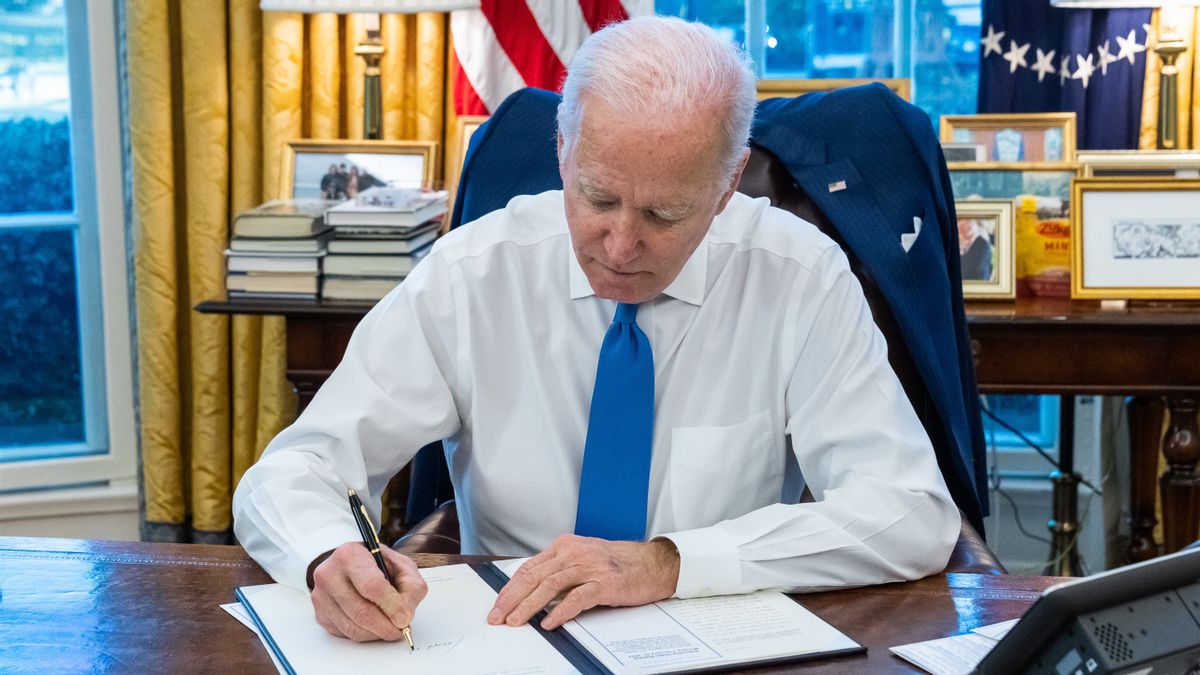JAKARTA – The United States President, Joe Biden, has announced economic sanctions in response to Russia's attack on Ukraine, Thursday, February 24. However, this sanction does not include cutting the country from payments on the SWIFT system or cryptocurrency transfers.
In Thursday's announcement from the White House, Biden said the US and its allies and partners would impose sanctions aimed at imposing a "devastating cost" on Russia for "Putin's war of choice against Ukraine."
The US president announced that the country would cut its financial system from Russia's largest bank, Sberbank, as well as impose "full blocking sanctions" on VTB Bank, Otkritie Bank, Sovcombank OJSC, Novikombank, and their subsidiaries.
Biden also named several elite citizens who had "enriched themselves at the expense of the Russian state" as part of the punishment imposed against Russia.
However, speaking to reporters last Thursday, Biden announced that the economic measures would not include breaking Russia from the SWIFT network, the payment system used around the world. They do however leave this option available to Russia whenever possible. But the US was unable to block cryptocurrency transfers, which it described could lessen the impact of sanctions imposed by the United States and its allies.
This morning, I met with my G7 counterparts to discuss President Putin’s unjustified attack on Ukraine and we agreed to move forward on devastating packages of sanctions and other economic measures to hold Russia to account. We stand with the brave people of Ukraine. pic.twitter.com/dzvYxj7J9w
— President Biden (@POTUS) February 24, 2022
According to Bloomberg last Thursday, Russian billionaires could potentially evade U.S. sanctions by using cryptocurrencies to buy goods and services and continuing to invest outside countries that are experiencing a harsher economic impact due to the invasion.
For example, individuals or foundations in Iran can ask for crypto donations for flood victims in 2019, even though the country is still under US sanctions. Likewise, Venezuelan President Nicolás Maduro, who proposed a law in 2020 that aims to use crypto to evade sanctions imposed on the country.
“If a wealthy individual is concerned that their account could be frozen due to sanctions, they can easily store their wealth in Bitcoin to be protected from the action,” said Quantum Economics founder and CEO, Mati Greenspan, as quoted by Cointelegraph.
Dmytro Kuleba, Ukraine's foreign minister, urged Russia not to be allowed to continue using the SWIFT network. President Biden said that sanctions imposed on five Russian banks "would have the same consequences, perhaps bigger consequences than SWIFT" but that cutting the country off the network would be considered "as an option" if necessary.
Both Biden and Kuleba directly discussed the possible impact of crypto in evading sanctions.
Biden's actions follow reports that Russia has launched an invasion of Ukraine, bombing a military airport near the capital Kyiv and striking targets across the country with missiles. Meanwhile, additional US troops have been sent to Germany and Poland in response to the attack. But Biden appears to be catching up with Russia both economically and with a show of military might.
However, the New York Times report suggested the sanctions may not have the effect the US president wanted.
"Russia has had plenty of time to think about these particular consequences," said former federal prosecutor Michael Parker. "It would be naive to think that they didn't play this scenario right."
The situation in Ukraine is still developing, but the financial impact of the attack has reached both crypto and traditional markets. Bitcoin (BTC) price dropped to $34.000 on February 24 amid news of the invasion. However, it has since recovered to trade above $38.000 on Friday morning.
SEE ALSO:
On Wednesday, newly discovered malware circulating in Ukraine had attacked hundreds of computers, according to researchers at cybersecurity firm ESET. Suspicion of the origin of the attacks falls on Russia, which has been repeatedly accused of hacking into Ukraine and other countries. The victims included government agencies and financial institutions. Russia itself has denied the allegations.
"This is an attempt to build a cyber military force that came too late," Aushev said of the creation of this cyber force.
A Ukrainian security official said earlier this month that the country does not have a special military cyber force. "Our job is to make it this year," he told the Washington Post, some time ago.
Aushev himself has stated that he has received hundreds of applicants and will start checking to make sure that none of them are Russian agents.
The English, Chinese, Japanese, Arabic, and French versions are automatically generated by the AI. So there may still be inaccuracies in translating, please always see Indonesian as our main language. (system supported by DigitalSiber.id)















